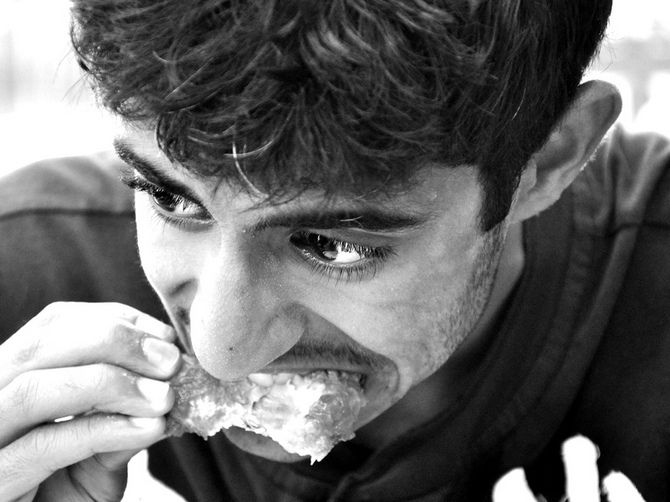The biggest step towards overcoming the habit of overeating is recognising that it exists
Regardless of our genetic tendency to eat everything in sight, we have the ability to train our brain and thus our body to control our eating behaviour.
In their book Losing it, Fitho.com founders Dhruv Gupta and Prachi Gupta write extensively about why we tend to gain weight and just how we can lose all of it!

Today we bring you the first part of an excerpt from the book with permission from Macmillan India.
Do you find yourself giving into the temptation of gorging on delicious food and before you can control it, it's too late and the damage of consuming excessive calories is already done.
Do you wonder, despite your efforts or desire to not overeat, why you find yourself making the same mistake (of overeating) repeatedly and how you can control it?
The need to obsessively overeat is mostly triggered by emotional or physical factors. Either you are too sad, too happy, too tired or simply bored when you get this intense urge to eat.
Because eating helps you manage the emotion better, you may overdo it.
Some might blame our ancestors for our compulsive bingeing behaviour.
Our primal ancestors were hunters and gatherers with no guarantee of the next meal so they went without food for long periods and once they found it, they ate everything they could get their hands on.
Regardless of our genetic tendency to eat everything in sight, we have the ability to train our brain and thus our body to control our eating behaviour.
The biggest step towards overcoming the habit of overeating is recognising that it exists.
You should not feel stuffed after a meal.
When your stomach is full it sends a signal to your brain indicating so.
But this signal takes about 15 minutes to process.
What this means is that only after 15 minutes of eating to a full stomach do you actually feel that way.
If you feel stuffed right after your meal, chances are that you have overeaten.
To manage this, start with reducing one item in your meal, and 'test your fullness' after 15 minutes.
You will soon find your optimum amount of food. If you are a fast eater, take a little longer to eat your food and you will need less food to feel full.
A very common reason for overeating is the sense of greed that may overcome you when you enjoy certain foods.
If you try eating slower, it will help you avoid overeating because of two reasons. First, it's the time taken for your body to signal 'fullness' to you.
Second, when you eat slower, your brain has more time to recognise the pleasure that it derives from the food that you are eating.
The more pleasure you derive from your food, the less you will overeat.
Beyond the sense of greed, there are certain foods that make you eat more.
These are foods with a high GI due to which they get absorbed very quickly by the body. As a result, they raise the blood sugar level.
To counteract this, the body over-releases insulin.
The extra insulin drops the blood sugar level, making you feel tired and lethargic.
To counteract this feeling, the brain sends you a signal to eat more.
This leads to a vicious cycle of eating.
Bingeing can easily add up to 1000-2000 calories above your daily calorie intake.
This means that you could potentially be eating anywhere between 40-100 per cent more than your daily calorie requirement while just chilling in front of the TV!
Eating a large meal with high fat content leads to an almost immediate build-up in the arteries, clogging them and increasing the risk of heart disease.
Knowing your triggers can help you minimise the damage.
We have cravings for high-carbohydrate or sugary foods as they spike insulin levels in the body and release endorphins, also known as the pleasure hormone.
This is the actual trigger that causes us to binge over and over again.
There is a healthier alternative to this addiction.
Exercise can also trigger the same happy hormone.
Besides, exercise is great for health and helps keep lifestyle-related disorders at bay.
The other downside to seeking solace in high-carbohydrate foods is that over a period of time the body develops a natural resistance towards them.
So it craves more quantities of food to get the desired effect.
For instance, if one slice of cake was enough to make you feel good the first time, with time you would need two slices to trigger the same feeling.
It is a tricky situation as it is easy to build a dependence on food to relieve stress or resolve any emotional problems.
Eventually, it is a game of mind over matter.
If you can understand your actions, you can control your behaviour in time and prevent causing damage to your health.
Conditioning your mind is the key to controlling this habit.
Here's the second part of the excerpt: How to control snacking!
Excerpted with permission of Macmillan India from the book Losing it by Dhruv Gupta and Prachi Gupta Rs 250.
Photograph: Jackie M Barr/Creative Commons
Image used here for representational purposes only.









